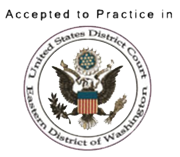WELCOME


Please call to schedule an appointment today!
(509) 560-7051
(509) 560-7051
WELCOME
Spokane Immigration
(509) 560-7051

Spokane Immigration – The mass movement of people who choose to settle in Inland Northwest’s Lilac City has created a major impact in the lives of many. This will forever change the landscape on economics, political system, and social and cultural development.
Defined as the influx / arrival of new individuals into a habitat, Immigration is a biological concept essential in population ecology.
Understanding Spokane immigration is not only limited to knowing the laws passed by the U.S. Congress, it also needs a well-thought understanding of judicial cases that implemented immigration and naturalization laws. The backbone remains essentially the same – an immigration policy that:
- Covers immigration with the aim of permanent residence, admission of refugees, deportation of illegal aliens, naturalization and citizenship policies, measures that influence the immigrant’s occupational and educational opportunities, and admission to health and welfare programs.
- Provides a logical framework in lawful admission of noncitizens, or “aliens”, be it permanent (immigrant) or temporary (nonimmigrant) admission. One approach is to give aliens the lawful permanent residents (LPRs) status, which will serve as a merit for permanent admission. Aliens admitted in this manner will be formally classified as “immigrants” and receive a permanent resident card (green card).
Because laws governing Spokane Immigration may be downright confusing at times, it is important to discuss citizenship:
- Embedded within the constitution is the decision on who belongs and who doesn’t, and who might join and who might not.
- Civil rights cover all people inside the country, including immigrants, not just citizens. Political rights include the right to vote, the right to assembly, the right to petition, and freedom of the press. In 1920, women were finally given the right to vote. Generally speaking, civil rights and political rights defend individuals from unnecessary government action. These rights guarantee freedom of participation in any civil and political gatherings without intervention, discrimination and repression from the state.
- Social rights cover social security, the right to work, the right to choice of employment, and 20th century rights. There is confusion, however, as to who (whether an immigrant or citizen) is afforded these rights.
- Cultural rights include the right to use your own language.
The 14th Amendment states that all persons born or naturalized in the U.S. and subject to the jurisdiction thereof, are citizens of the U.S. and of the State wherein they reside. This means that ambassadors of other countries are not to be included as subject to the jurisdiction. In addition, no state may offer or withhold citizenship, nor shall the state deny.
In shaping immigration policies, there are factors that have played essential roles:
- Racial, religious and gender beliefs
- Perceived economic needs of the country
- Societal and cultural perceptions
- Domestic political struggles
- Foreign policy considerations
With these conflicting key variables, perhaps there must be truth to the quote, “Immigration is the sincerest form of flattery,” by Jack Paar.
In Spokane, migrant groups that are up to exciting challenges and opportunities are categorized as:
- Young and well educated
- Young and less well educated
- Retirees
For Spokane Immigration concerns, contact the Quiroga Law Office, PLLC at (509) 560-7051.







